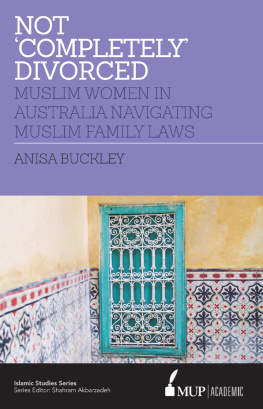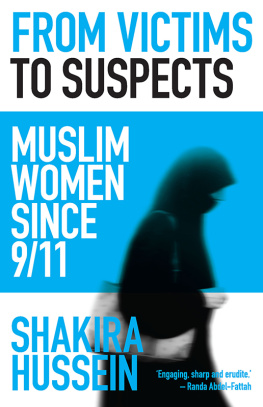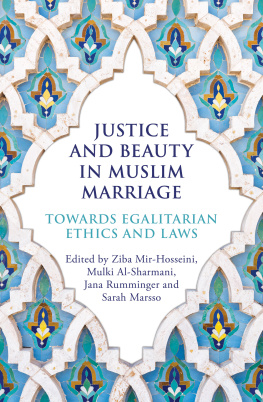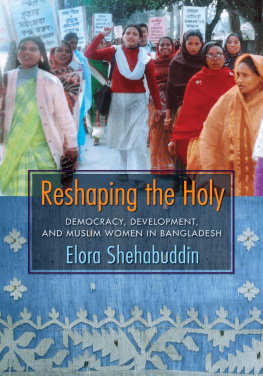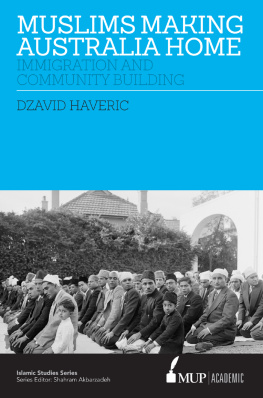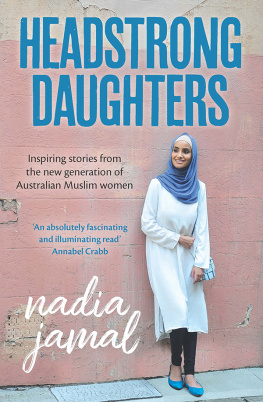Dedicated to my four beautiful children
Junayd, Amali, Zidane and Diani
Not Completely Divorced
Muslim Women in Australia Navigating Muslim Family Laws
Anisa Buckley

MELBOURNE UNIVERSITY PUBLISHING
An imprint of Melbourne University Publishing Limited
Level 1, 715 Swanston St, Carlton, Victoria 3053, Australia
www.mup.com.au

First published 2019
Text Anisa Buckley 2019
Design and typography Melbourne University Publishing Limited, 2019
This book is copyright. Apart from any use permitted under the Copyright Act 1968 and subsequent amendments, no part may be reproduced, stored in a retrieval system or transmitted by any means or process whatsoever without the prior written permission of the publishers.
Every attempt has been made to locate the copyright holders for material quoted in this book. Any person or organisation that may have been overlooked or misattributed may contact the publisher.
Text and cover design by Philip Campbell Design
Typeset by J&M Typesetting
Printed in Australia by OPUS Group

9780522875904 (paperback)
9780522875898 (hardback)
9780522875911 (ebook)
Contents
Acknowledgements
You who believe, be steadfast, more steadfast than others; be ready; always be mindful of God, so that you may prosper. (Quran 3:200)
To my four beautiful childrenJunayd, Amali, Zidane and Diani.
To my mother Silma and father Siddiq: I owe you both so much for all the sacrifices you made while raising me and my siblings, for your continual dedication to improving the Muslim community and for instilling the love of Islam in my life.
To my stepmother Rukshana: many thanks for all the help you have given us in looking after our children and for loving all of us as your own.
To my siblings, their better halves and my wonderful nephews and nieces: Makeen, Tracy, Layla, Noah, Joshua, Omar, Nicky, Joanne, Dexter, Muneer, Marryam, Matteo, Zain, Cyrus, Haneefa, Elyse, Adam and Aisyah: thank you for your constant encouragement and for all the joy that family brings.
To my grandparents Joyce, John, Patricia, Joan and David: although most of you did not get to see me reach this far I am ever grateful for the love and advice you have given me, and for the lessons you passed down to me from your own life experiences.
To my in-laws Rokkiah and Omar: I am deeply indebted to you both for your unfailing support and love to Imran and myself during our PhD journeys, for your timely advice and the unique insights you have granted us through your own studies.
To Melati, James and Ilyaas: thank you for welcoming me into your lives as a sister and aunt with such open arms, and for helping me through the challenging early years of moving away from my own family.
To all my dear friends, while living in Melbourne and London you were my family away from home and back in Sydney you helped me resettle again, you brought light and life to our house through Arabic class, you kept me focused by helping babysit the kids, and kept me sane through your friendship.
To my supervisors Professor Abdullah Saeed and Professor Tim Lindsey, thank you for your guidance, incredible patience and constant support. Thank you also to Professor Riaz Hassan for your continuing advice throughout my studies. Thank you to my Arabic teachers, Sheikh Suleiman Noureddine, Dr Abdul Samad Abdullah and Dr Adrian Gully, for giving me a deep appreciation of the language.
I am grateful to all the participants who contributed their perspectives and gave up their valuable time for this study, especially the brave women who shared their experiences of divorce, as well as Sheikh Hassan, Sheikh Salman, Dr Latif and Dr Yasmin, all whom passed away before I completed this book.
And finally, to Imran, my amazing husband and father of my wonderful children. You have always been my rock, constantly guiding and encouraging me to persevere, and relentlessly supporting me to achieve my goals. Doing our research together has been an incredible journey, and I am forever grateful for having you in my life.
I dont see divorce as being a problem. I find oppression as being a problem. I find people that are being treated badly as being a problem, people being unhappy, as being a problem. I dont see divorce as being problematic and something that we need to overcome. I think we need to overcome a situation that leads to divorce, which means theres been a lot of problems and a lot of unhappiness and pain in that process. But to say that theres a marriage here, we have to save the marriage, is not my position.
Interview with Karim, community worker, Sydney, 2006
Introduction
This book explores the experiences of Muslim women in Australia who seek to have a Muslim divorce, in conjunction with a civil divorce, so as to be completely divorced. The processes of Muslim divorce in Australia are unofficial and operate parallel to formal, official civil divorce procedures; however, many Muslim women interviewed for this book feel that they are not completely divorcedin other words, able to remarry in the eyes of their communityunless they have secured a Muslim divorce, whether or not they have a civil divorce. This dilemma affects Muslim women more than men due to the belief, according to Muslim community interpretations of Muslim family laws, that men are able to divorce their wives unilaterally while women must secure their husbands consent to be divorced.
The phrase not completely divorced in my title does not imply my agreement that women are trapped in limping marriages; rather, it serves to highlight the dilemma they find themselves in. At all levels, from families to friends to community groups to religious authorities, women are told that they are not completely divorced unless they have a definitive religious divorce. But how do they decide what is definitive to them? Is it when their husband says, you are divorced or do they have to specifically mention the word talaq? Is it when their husband walks out on them or simply refuses to maintain them and their children? Is it when they have waited three months or more after a supposed proclamation of divorce only to have their husband assert that he didnt remember saying it in the first place? Is it when they leave the marital home after repeated abuse then seek to initiate divorce themselves? And what if their husband refuses to agree to it and tells them they have no right?
While there is acceptance among contemporary Muslims, both in Australia and worldwide, that women have access to religious divorce in Muslim family laws, that access is mitigated by various factors that impinge upon the ability of some Muslim women in Australia to initiate or finalise a religious divorce. These factors include: patriarchal and conservative approaches to womens rights in divorce according to majority opinions in classical legal jurisprudence; restrictive social norms and practices; and reliance upon decisions by local religious authorities. From the outset, I acknowledge that the terms patriarchal and conservative are contentious; however, they reflect certain insights into community power structures and authority that have a direct bearing upon Muslim womens abilities to make choices for themselves. Janet Rifkins definition of patriarchy is any kind of group organization in which males hold dominant power and determine what part females shall and shall not play, and in which capabilities assigned to women are relegated generally to the mystical and aesthetic and excluded from the practical and political realms, these realms being regarded as separate and mutually exclusive. Deniz Kandiyoti notes that the term
Next page
